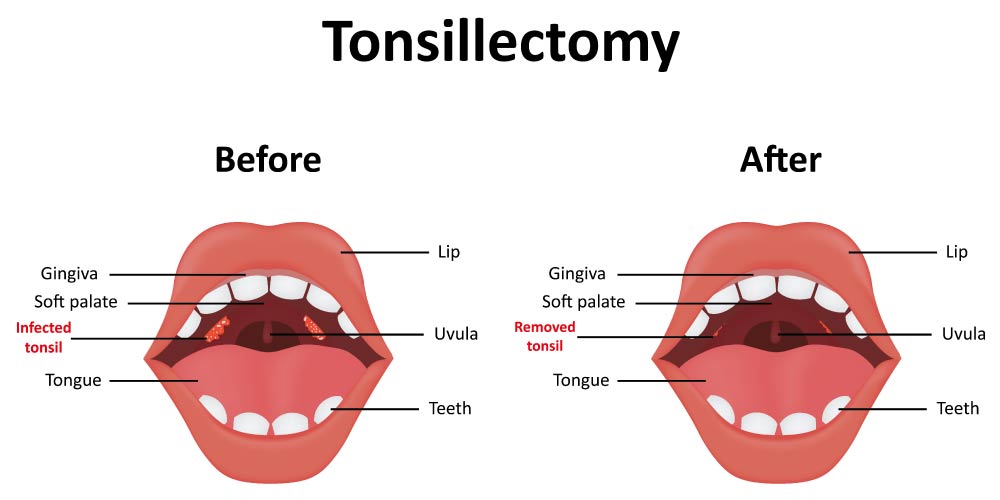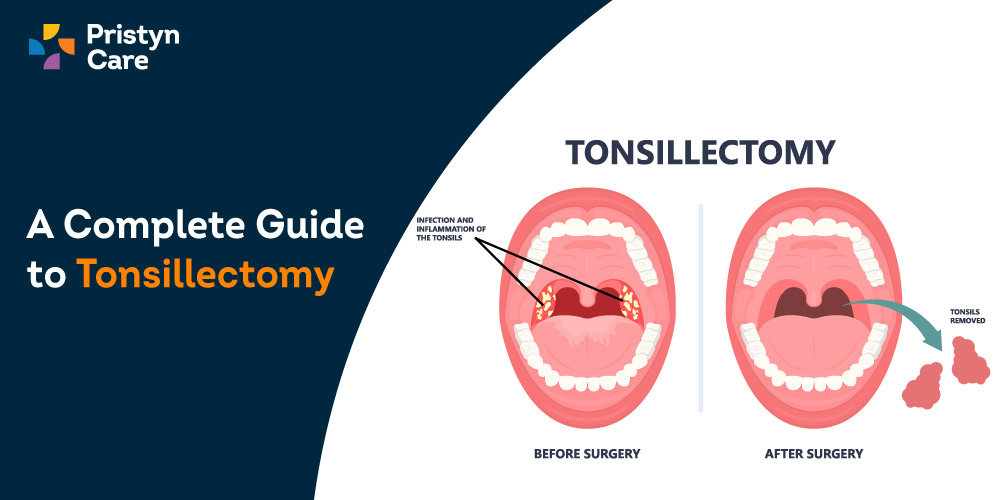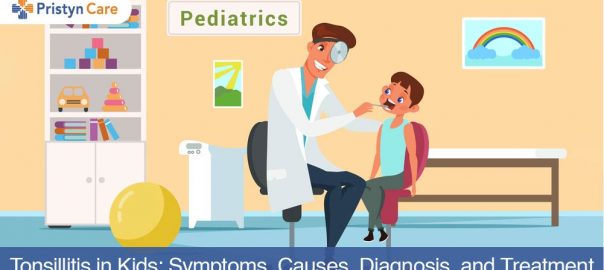![]() Views: 1,968
Views: 1,968
A Complete Guide to Tonsillectomy
Tonsillectomy refers to the surgical procedure to remove swollen or inflamed tonsils. Inflammation in the tonsils is called tonsillitis which occurs due to constant viral or bacterial infections. While some symptoms of tonsillitis can be managed by medications, ENT specialists recommend tonsillectomy surgery to permanently get rid of sy...
mptoms such as sore throat, sleep apnea, occasional breathing issues, snoring, etc. Read moreHere we are discussing the tonsillectomy procedure and how you can smoothly recover from it. .
Dedicated Support at Every Step!
Our Doctors are available 24 hours a day, 7 days a week to help you!
Table of Contents
What is a Tonsillectomy Procedure?
Tonsillectomy is considered an effective surgical procedure to remove infected tonsils. The ENT doctor conducts several diagnostic tests, such as a physical examination of a throat to confirm the swelling in the tonsils. The advancements in modern science and technology have made surgical procedures less risky and more effective.
Before the surgery, the anesthesiologist gives anesthesia to the patient. This sedates the surgical site so that patient does not feel any pain during the operation. There are certain instructions given to the patient prior to the surgery to prevent complications. The surgeon then carefully inserts a long, flexible device called an endoscope inside the mouth, which is kept open with the help of medical equipment. The device is fitted with a camera and light on the other end that enables the surgeon to locate the infection or swelling in the tonsils. The surgeon then ablates the tonsils using a blade (scalpel), cold knife, etc., along with a high-energy heat device to minimize bleeding. This ensures faster recovery and minimal post-operative bleeding.

Overview of Tonsillectomy
No Cost EMI, Hassle-free Insurance Approval
What functions do tonsils perform?
Tonsils are an important part of the immune system, especially in kids. They act as the gatekeepers of the oral cavity.
Because of their convenient location, they are responsible for stopping the germs entire the body through the mouth or nose. They also contain white blood cells, which help in killing germs. In addition, tonsils provide a barrier and stop children from swallowing foreign objects.
Does tonsillectomy affect the immune system?
No, various research studies have concluded that tonsillectomy has virtually no effect on the immune system or its functioning. This is because as a child grows, their immune system develops and becomes more capable of fighting infections. After a period of time, the tonsils become almost useless, and the bulk of its actions are taken over by the rest of the immune system.
However, in very young kids, a tonsillectomy can, in rare cases, increase the incidence of common colds and other upper respiratory tract infections.
Who needs a tonsillectomy?
A tonsillectomy is generally performed for tonsillitis and related tonsil problems. Normally, tonsil infection and inflammation only occur in children but it can occur at all ages. However, normally just one instance of tonsillitis does not justify or necessitate tonsillectomy.
Tonsillectomy is usually recommended to a patient if they’ve had:
- at least seven cases of tonsillitis or strep throat in the past year, or
- five or more bouts of tonsillitis every year in the past two years, or
- three or more episodes of tonsillitis every year in the past three years.
In acute or non-recurring cases of tonsillitis, tonsillectomy may be recommended if you are not getting adequate relief from medical (conservative) treatment or if the tonsil infection is leading to pus collection behind the tonsils.
In this article, we have outlined everything you should know regarding tonsillectomy treatment, procedure, and recovery.
Which diseases can be treated using a tonsillectomy?
Tonsillectomy can be performed to treat a variety of conditions such as:
- Recurring, chronic, or severe infection of the tonsils
- Breathing problems due to swollen/enlarged tonsils
- Frequent and loud snoring due to airway obstruction
- Sleep apnea, i.e., breathing difficulties while sleeping due to swollen tonsils
- Recurrent bleeding of the tonsils or blood vessels surrounding the tonsils
- Severe halitosis (bad breath) due to tonsillar debris
- Tonsil stones
- Tonsil cancer
When does tonsillectomy become necessary?
Tonsillectomy is generally considered to be necessary if the symptoms related to tonsillitis, such as pain and difficulty in swallowing, swelling in the neck glands, etc., are severely impacting your life or if you are not experiencing adequate relief from tonsillitis even after maximum medical treatment.
Tonsillectomy is also preferred over medical treatments if the patient has a tonsillar abscess, i.e., collection of pus behind the tonsils, accompanied by severe pain, fever, swelling, etc.
What are the indications and contraindications for tonsillitis?
| Indications | Contraindications |
| Airway obstruction | Bleeding disorders |
| Uncontrolled infection of the tonsils | Allergy to anesthesia |
| Tonsil cancer | Anemia |
| Chronic/recurrent infection of the tonsils | Acute infection of the tonsils |
How to prepare for tonsillectomy surgery?
Depending on the cause of the tonsil problem, patients often receive specific instructions on how to prepare for the surgery. Listed below are some common tips and instructions you can follow to prepare for tonsillectomy surgery:
- Take all medicines and supplements as prescribed. Do not over or under-medicate yourself, as that may worsen your condition.
- Inform the doctor if you have allergies, bleeding disorder, chronic health problems, etc. In such cases, the doctor needs to modify the procedure to make it safer for you.
- In case you are taking any blood thinners or similar medicines, you may need to halt them or alter their dosages for a few days before and after the surgery.
- Do not eat anything for at least 8-10 hours before the surgery. Generally, patients are advised to stop eating at midnight before the day of the surgery.
- The recovery may take up to 2 weeks in some cases, so patients are generally advised to plan accordingly. You should also prepare in advance and if you have any pets or young kids, you should arrange for their care for the first few days after the surgery.
Also Read: How to cure tonsils fast?

Tonsillectomy is an outpatient surgery that usually takes around 30 minutes to 45 minutes, depending on the surgical expertise of the surgeon and the medical health of the patient. Tonsillectomy is a safe surgery for children as well as adults if done by an experienced ENT surgeon. There are different surgical techniques involved during tonsillectomy.
- Coblation tonsillectomy - The surgeon removes the infected tonsils by eliminating the surrounding tissues that attach them to the pharynx. The surgeon uses low radio frequency during the operation, which is usually less-invasive pain.
- Cold knife dissection - As the name suggests, the surgeon ablates the swollen tonsils using a steel scalpel. There is minimal pain involved since the patient is under anesthesia. Excessive bleeding is prevented by using sutures or extreme heat (electrocautery) after the surgery.
- Electrocautery or Cauterization - This technique uses heat treatment to remove the infected tonsils by simply burning away the tissues through cauterization. The procedure ensures minimal bleeding due to heat treatment.
- Harmonic scalpel - This method uses ultrasonic energy to vibrate the blade and so the blade removes inflamed tonsils and stop bleeding at the same time.
- Radiofrequency - This method ablates the tonsils using high radiofrequency energy.
Also Read: Procedure of Tonsillectomy ( Tonsils Removal Surgery)

Complications of Tonsillectomy
Tonsillectomy is a major surgery which means it may involve complications during or after the procedure. However, the probability of risk depends on the medical health of the patient and how their bodies react to certain medication and treatment procedures. However, ENT surgeons at Pristyn Care provide a comprehensive approach to the patients to nullify the possibility of potential risks and complications before the surgery. Possible complications during tonsillectomy include -
- Swelling - Some patients may experience swelling during the first few hours of tonsils operation. They may experience swelling in the tongue and soft palate that may cause breathing problems.
- Infection - There are rare chances of infections during the surgery that may require further treatment. This can be minimized by informing your doctor about any ongoing medications or medical conditions before the surgery.
- Reaction to anesthesia - Some individuals have a history of allergic reaction to anesthesia (medication to makes you unconscious). The reaction may cause short-term problems such as nausea, vomiting, headache, muscle soreness, etc. It is important to convey your history of allergic reactions to the surgeon before the surgery.
- Abnormal bleeding during the surgery - There may be excessive bleeding during the surgery in rare cases, which may require longer hospital stays. This is usually dependent on the health condition of the patient and the surgical expertise of the surgeon.
Side effects after a tonsillectomy are rare but should not be ignored. Possible side effects after the surgery involve pain, nausea, and minor postoperative bleeding. If there is no excessive bleeding during the first 24 hours of surgery, there is nothing to be concerned about. However, consult with your ENT doctor if you experience any of the following after your tonsillectomy -
- A fever that may persist after the surgery. Call your doctor if you or your child experiences a fever higher than 102 F (38.9 C).
- Dehydration can be a rare issue after the surgery. Common signs of dehydration involve reduced urination and thirst, fatigue, headache, and dizziness.
- Abnormal bleeding from the nose or saliva can occur within 5 to 10 days of the surgery. Contact your doctor in case you experience excessive blood loss.
- Breathing issues that involve noisy breathing or airway obstruction in children.
Recovery after tonsillectomy surgery
The ENT surgeon usually provides post-operative instructions that are necessary to follow for a quick and smooth recovery after tonsil surgery. You may notice tonsillectomy scabs that form right after the surgery. They usually remain in place for around 5 to 10 days and eventually fall off. However, if they fall off before time, they can cause bright red bleeding and require medical attention.
The recovery time after tonsillectomy can take around 14 days, depending on the medical health of the patient. Your child can go back to school within two weeks after a tonsillectomy after consulting with the doctor. During that time, the following recovery tips can help you reduce discomfort and help you recover faster.
Take adequate rest -
Take adequate rest after the surgery. Refrain from speaking too much since your throat is swollen and can induce bleeding. You must also avoid strenuous activities such as running, cycling, or other adventure sports that can increase the risk of injury for about 2 weeks. You can resume your daily routine within a week if your doctor does not suspect any possibility of complication.
Drink enough fluids -
It is important to stay hydrated after the tonsillectomy procedure. The key to a faster recovery is making sure you drink enough fluids. Cold smoothies and shakes are often recommended after surgery since they are easy to consume.
Dietary changes -
The patient must avoid foods with hard edges as they can cause discomfort. It is also important to avoid spicy food to reduce discomfort. Some of the food recommendations after tonsillectomy are -
- Ice creams
- Yogurt
- Warm, clear broth
- Mashed potatoes
- Scrambled eggs
- Puddings
- Applesauce
Pain management -
Pain usually persists for about 4-5 days after the surgery, and it may even get worse for some patients. Therefore, it is advised to take several OTC medications, such as acetaminophen, ibuprofen, etc., that can help reduce the pain and discomfort after the surgery. However, you must consult your doctor before taking the medications for yourself or your child.
Home Remedies -
The ENT doctor may recommend several home remedies to reduce the discomfort and help recover from the pain quickly. Some of the home remedies to take care of tonsillitis include the following -
- Place ice packs on the neck several times a day.
- Consume ice pops to reduce swelling in the throat.
- Chew sugar-free gum to reduce spasms after surgery.
- Encourage taking honey to soothe your sore throat after the surgery.
Post-operative consultation -
It is important to check with your ENT specialist and visit the doctor for a follow-up appointment within 3 to 5 weeks of the surgery. This enables you to assess your recovery and prevent any possible complications. You must also consult with your ENT specialist if they have any queries or concerns regarding you or your child's health after the surgery.
What is the difference between tonsillectomy in adults vs. tonsillectomy in children?
| Adult Tonsillectomy | Pediatric Tonsillectomy |
| Procedure takes about 30 to 45 minutes | Procedure takes 30 to 60 minutes. |
| Recovery period is 2-3 weeks. | Recovery period is less than a week. |
| More likely to get postoperative complications such as bleeding, pain, dehydration, etc. | Less likely to develop postoperative complications. |
| Considerable scarring after the surgery | Minimal scarring after the surgery |
| Affects the voice negatively during the recovery period | No effect on the voice |
Is tonsillectomy covered under insurance?
Yes, tonsillectomy is generally covered by most major insurance policies, however, this coverage may be subject to specific policy terms such as waiting period, sub-limit, etc. If you are unsure about your insurance policy coverage, you should connect with your insurance provider to find out your exact policy terms and coverage.
Conclusion
Tonsillectomy is one of the most effective and advanced surgical procedures to treat inflammation or swelling in the tonsils. It offers long-term health benefits and reduces several symptoms of tonsillitis for improved quality of life. There are possible complications during the procedure. However, the long-term benefits of tonsillectomy outweigh all the risks. Pristyn Care has some of the best ENT surgeons with more than 15 years of experience in performing ENT surgeries. Get in touch with us to book an appointment with some of the best ENT surgeons near you for tonsil removal surgery.










